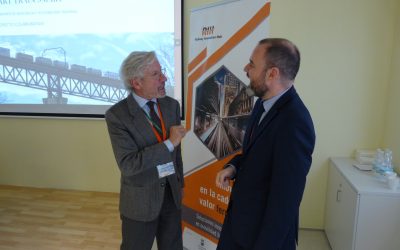Pneumatic collection is identified by the European Commission as one of the best practices of environmental management in the waste collection sector
The president of Envac Iberia, Carlos Bernad, says that “the constant innovation experienced in recent years by pneumatic technology allows to obtain efficiency ratios per tonne of waste collected and energy consumption hardly achievable by traditional systems”
17 Jan 2020
Pneumatic collection systems are considered by the European Commission among the best environmental management practices in the waste collection sector. This is reflected in the document Best Environmental Management Practice in the Waste Management Sector, commissioned by the community executive, which recognizes that pneumatic collection is an interesting alternative in the field of logistic optimization of waste collection in urban areas.
“Pneumatic systems avoid the need for collection vehicles to enter urbanized areas where traffic congestion, noise and the effects of air pollution are more problematic. Therefore, they can lead to a significant improvement in urban environmental quality,” says the document.
The report also emphasizes another series of advantages that pneumatic collection provides over other conventional methods, such as “considerable reduction in operating costs”, apart from “significant savings in fuel use, noise reduction, visual impact, odors and traffic associated with conventional waste collection systems”.
Four times lower operating costs
On the investment that these systems require in technological equipment and civil works, the European Commission report also highlights that the pneumatic installations are designed to last up to 60 years and have amortization periods of 10 to 12 years, due to the lower operating costs in Comparison with conventional collection.
On this aspect it also provides a comparison between pneumatic and conventional collection. According to the document, for a core of 10,000 apartments, the annual operating cost would be 150,000 euros with pneumatic collection, while with the conventional one it would multiply up to five times, reaching 650,000 euros. In relation to this data, the study indicates that pneumatic collection presents more favorable economic conditions in cities, where the cost of land is more expensive.
“Alternative pneumatic systems are intended to alleviate the problems associated with the collection of waste in densely populated areas, and are easier to install in new developments,” says the report, which also highlights that “space restrictions and high prices of the ground are an important factor that favors pneumatic systems, by preventing the installation of garbage storage areas ”.
Regarding the environmental section, the Commission document also assesses that NOx emissions are lower with pneumatic collection, which improves air quality in urban areas, and also positively assesses the energy savings improvements presented by the new developments of this technology.
More than 800 pneumatic installations in the world
Regarding the assessment made by the European Commission of pneumatic collection, the president of Envac Iberia, Carlos Bernad, says: “The inclusion of pneumatic collection among the best practices of environmental management in the waste collection sector is consistent with a system that remains at the forefront of specialized technologies in waste collection. In addition, within sustainable urban development, it constitutes the definitive substitute for traditional truck collection, solving environmental problems, aesthetic impact, pollution and air quality of cities, as well as road occupancy posed by other systems.
The president of Envac Iberia also emphasizes that “the constant innovation in the field of pneumatic collection, thanks to an operating park in the world that exceeds 800 installations, is allowing the systems to obtain efficiency ratios per ton of waste collected and consumption energy hardly reachable by the collection systems with trucks ”. In this regard, he notes that “the electrical energy necessary for the operation of the plants can be generated with photovoltaic panels, so that the energy balance necessary to collect and transport the garbage is neutral.”
“At this time, the park installed in the world begins to incorporate elements of artificial intelligence, which will allow controls, measurements and possibilities of use increasingly adjusted to the needs of users. We are able to charge the cost of this basic service to citizens based on the amount of use they make of it, in a completely proportional way to the generation of garbage by each family or user”. Carlos Bernad
Envac Iberia is the subsidiary company in Spain of Envac AB, one of the leading environmental technology companies in Sweden that heads the pneumatic waste collection industry worldwide. The company owes the invention of automated waste transport technology in the early 1960s, and its systems can be found on several continents, in residential areas, commercial premises, urban centers, industrial kitchens, hospitals and airports. Envac has 35 offices in 22 countries in Europe, the Middle East, Asia and North and South America.
+ Related posts
Know the advantages of being associated
Smart City Cluster enhances collaboration among its partners, favoring research, development and innovation in the different solutions and technologies aimed at the development of smart cities.
Smart City Cluster is an alliance of private companies and institutions that work for the development of smart cities.



